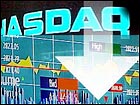The tech fund implosion
Two years after the Nasdaq hit its peak, 40 funds have closed and many more are suffering.
March 8, 2002: 6:09 p.m. ET
By Staff Writer Martine Costello
|
 NEW YORK (CNN/Money) - Before March 10, 2000, tech fund managers had one of the easiest jobs on earth.
NEW YORK (CNN/Money) - Before March 10, 2000, tech fund managers had one of the easiest jobs on earth.
Everything was going up. Qualcomm, up 2,600 percent in 1999. JDS Uniphase up 836 percent. Any idea, no matter how lame-brained the business plan sounds now, sent investors into a tizzy.
Then came March 10, when the Nasdaq reached its peak of 5,048. From that moment, tech funds haven't just been in a bear market. They've been in a nuclear winter.
"There were a lot of flameouts," said Chris Traulsen, an analyst with Morningstar.
Pain and agony in the sector
On average, tech funds gained 135.7 percent in 1999, but lost nearly 69 percent since the index peaked, according to Morningstar. The funds bled 31.7 percent in 2000 and 38.9 percent last year. (Click here for more on the winners and losers in 2001.)
About 40 tech funds, most that focused on torched Internet stocks, have closed or merged. At the end of 2000 there were as many as 172 tech funds; now the number is down to about 156. Internet funds dropped from 43 at the height of the bubble to about 19.
Total assets in tech funds also slipped from a high of $87.4 billion in 2000 to $55 billion this year as of March 7, according to TrimTabs.com, a California fund flow tracker.
Casualties of a vicious bear market
One of the most prominent flameouts in tech funds was at Merrill Lynch. Star manager Paul Meeks had headed Merrill Lynch Global Technology and Merrill Lynch Internet Strategies Fund.
| |
 SOME TECH FUND CASUALTIES SOME TECH FUND CASUALTIES
|
|
| |
|
Federated Large-Cap Tech
Merrill Lynch Internet Strategies
AIM Global Telecom and Tech
ING Internet
Source: Morningstar
|
|
|
The company merged the Internet assets into Global strategies in late 2000. The red ink continued at Global Technology and Meeks left the helm in December. (Click here for more on fallen fund manager stars.)
Global Technology, which earned 88.6 percent in 1999, lost 34.1 percent in 2000 and 40 percent last year, Morningstar said. Those numbers put the fund behind the index and the category in both years.
Chip Morris, a longtime star manager at T. Rowe Price Science & Technology, left the fund in January. The fund company insists bad performance wasn't the reason, but the fund lagged behind its peers in bull and bear markets. "He had a rough time," Traulsen said of Morris. "People were disappointed with the results."
As for Internet funds,� failures such as TheGlobe.com and eToys took their toll. Kinetics Infrastructure Fund, gone. Internet Global Growth, gone. Westcott Nothing But Net Fund became Westcott Technology, and the fund is still dragging in the bottom quarter of its category this year, Morningstar said.
A few bright lights
Still, amid the misery, there have been some funds that have survived relatively intact. Seligman Communications & Information, headed by Paul Wick, actually made money last year, up 3.6 percent. This year, it's down 4.4 percent, but still ahead of the category.
Wasatch Global Science & Technology, which bravely came onto the scene in January 2001, earned a healthy 12.4 percent last year. And the top performing tech fund in 2001? An Internet fund, Kinetics Internet Emerging Growth. But the fund's top holdings included a British life insurer. (Click here for more on the fund.)
At Waddell & Reed Science & Technology, manager Zack Shafran has stayed in the top 11 percent of the category since 2000 because of several strategies. For one, he kept higher cash levels of 15 percent-to-25 percent, which allowed him to avoid disasters and take advantage of buying opportunities.
And while the fund remains 75 percent or more in science and tech, he also moved some assets into defensive areas. Among his winners were Forest Labs in health care; Burlington Resources, a natural-gas provider, and Concord EFS, a top processor of debit card transactions. In traditional tech, he also owns networking heavyweight Cisco Systems and wireless stock Research in Motion.
Shafran said the lesson of the tech implosion for Main Street investors goes beyond the doorstep of the Nasdaq. A company, no matter what sector, must have a clear path to profitability, he said. And regardless of where you're looking, you need to think about diversification.
Because just as stocks can go up, the trip down can be painful.
"The degree to which some of the businesses imploded is just amazing," Shafran noted. 
* Disclaimer
Click here to send mail to Martine Costello
|
| SPECIAL: |
|
|
|
|
|

|

